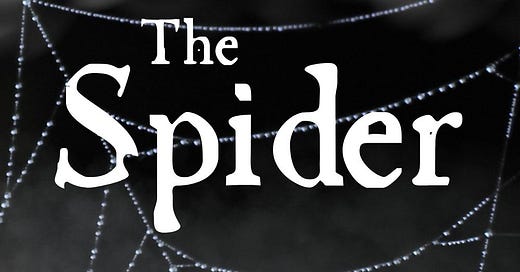Chapter 1-4| Chapters 5-6| Chapters 7-8|Chapters 9-11| Chapter 12|Chapter 13|Chapter 14-15|Chapter 16-17|Chapter 18-19
We are more than halfway through this story already! The Spider is a gothic horror mystery novel set in late Victorian Liverpool. Thank you for tuning in every week. If you love this story, don’t forget to like, comment or share to spread the word. It’s free!
Little Elsie Bryant was playing in the nursery when Muldoon knocked gently on the door. Sarah opened it and judging by her face, seemed relieved to see him. “Inspector,” she said, holding a bundle of linens in her arms. “I was just tidying up in here. How can I help you?”
“I thought I’d have a look at the nursery while the doctor is visiting Mrs Bryant.”
“Of course,” she said, walking back into the room. She placed the linens in one of the large dressers and started picking up toys. “Just let me get these things out of the way.” A line of dolls had been assembled across the room from the wardrobe to the bed.
“No!” called Elsie from the far end of the room. “Those are my maids.”
“Elsie, the Inspector needs to look around the room and—”
The child darted over to the dolls and tried to shield them from Sarah with her body. “Mary needs pretty maids all in a row!”
“Elsie!” Sarah commanded, standing up straight. The child dropped to her knees and began to wail.
“Elsie,” Sarah said again, through her teeth this time. “Stop with the foolish behaviour, now. Or there’ll be no supper.”
The child continued to wail, pausing only to release a high pitched scream with a beetroot face. Sarah grabbed an arm and forced her to stand on her feet but she wrestled out of her governess’ grip and fled the room. Muldoon, not wanting to collide with the furious, miniature fugitive, stepped aside and let her pass. “Elsie!” Sarah called, readjusting the hair that had come loose in the struggle. She stopped and let a doll drop to the floor, its emotionless face landing where it could stare at Muldoon. Sarah said nothing for a moment and sat down in a chair, looking drained. “She needs her mother, Inspector. It’s hard when she’s in the house, but she can’t see her.”
“It must be, but I’m sure you are doing a fine job,” was all he could think to say.
“You’re not around little children much, are you?” she said with a smile.
Muldoon smiled back, relaxing his shoulders. “Is it that obvious?”
Sarah laughed, despite herself. “It is. It is.”
“Guilty,” he said, raising his hands. “They’re an anomaly to me.”
Keep reading with a 7-day free trial
Subscribe to A Work Of Fiction to keep reading this post and get 7 days of free access to the full post archives.




